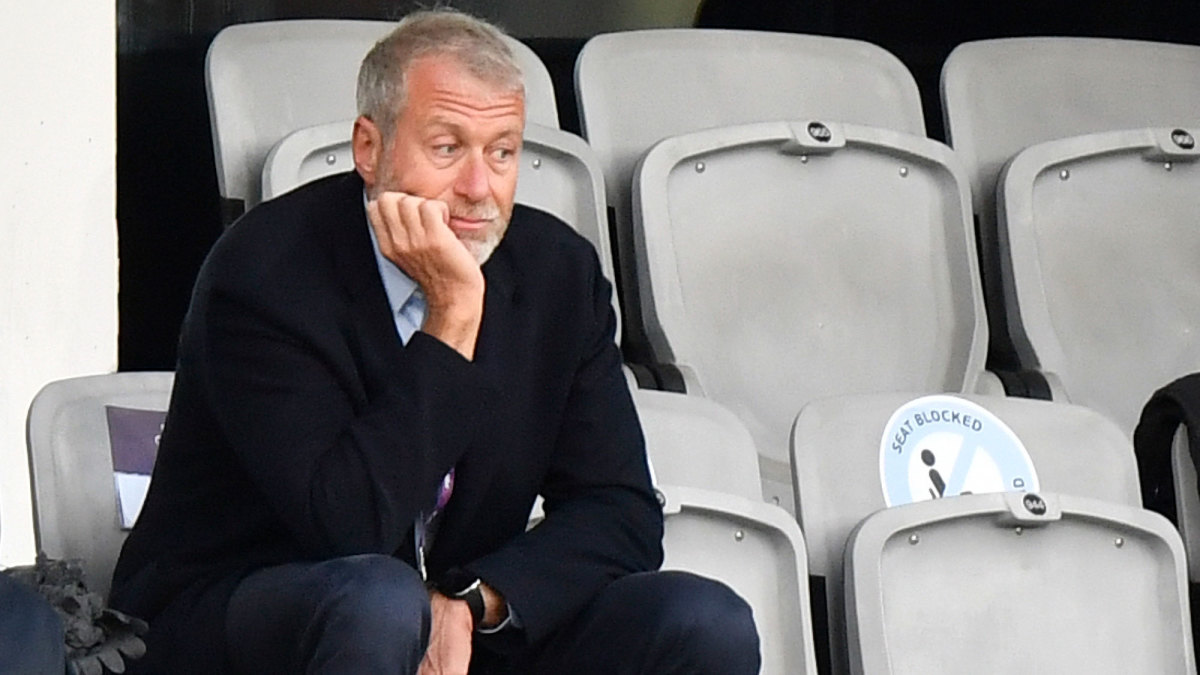U.K. Government Puts Abramovich, Chelsea on Ice
Chelsea Football Club was plunged into chaos on Thursday with the news that the U.K. government has imposed sanctions on its owner, Roman Abramovich. He was one of 204 individuals named in the list of sanctions, along with 65 organizations. Although the club has been granted a special license until the end of May to allow it to fulfill its remaining fixtures this season, it will be functioning under major restrictions.
Although the threat of sanctions has been looming since Russia invaded Ukraine 15 days ago, leading Abramovich initially to offer to hand over “stewardship and care” of the club to its trustees and then to acknowledge he had to sell, the timing of the move and the scale of the government denouncement of him still came as a shock.
“These measures,” said a spokesman for the Prime Minister Boris Johnson, “are obviously designed to punish Putin and ensure any revenue generated cannot make its way through to the Russian war machine."
The document released by HM Treasury’s Office of Financial Sanctions Implementation described Abramovich as “a pro-Kremlin oligarch” who was “associated with a person who is or has been involved in destabilizing Ukraine and undermining and threatening the territorial integrity, sovereignty and independence of Ukraine, namely Vladimir Putin, with whom Abramovich has had a close relationship for decades.”

That in itself is a dramatic statement given that Abramovich has always denied links to Putin and has been extremely litigious in his denial.
“This association has included obtaining a financial benefit or other material benefit from Putin and the Government of Russia,” it continued. “This includes tax breaks received by companies linked to Abramovich, buying and selling shares from and to the state at favorable rates and the contracts received in the run-up to the 2018 World Cup. Therefore, Abramovich has received preferential treatment and concessions from Putin and the Government of Russia.”
It was also claimed that Abramovich “has been involved in destabilizing Ukraine and undermining and threatening the territorial integrity, sovereignty and independence of Ukraine, via Evraz PLC, a steel manufacturing and mining company in which Abramovich has a significant shareholding and over which Abramovich exercises effective control.
“Evraz PLC is or has been involved in providing financial services, or making available funds, economic resources, goods or technology that could contribute to destabilizing Ukraine or undermining or threatening the territorial integrity, sovereignty or independence of Ukraine—which includes potentially supplying steel to the Russian military which may have been used in the production of tanks.”
What that means in practical terms is harder to say. Club staff will continue to be paid, and Chelsea is to fulfill any payments remaining on deals entered into before today. It can pay for travel to games (up to £20,000) and for security at home games. Equally, it will continue to receive payments from television rights deals. Food concessions at the stadium will remain open. But the club is not permitted to sell any tickets or merchandise; the club shop was closed on Thursday morning while the club hotel has had to stop serving food and beverages. Nor can Chelsea offer new contracts: captain César Azpilicueta and central defenders Antonio Rüdiger and Andreas Christensen are the highest-profile players whose contracts expire in the summer. Should these sanctions last into the summer, Chelsea would effectively be under another transfer ban. The club has said it is in dialogue with the government over the precise terms of the license.
“We will fulfill our men’s and women’s team fixtures today against Norwich and West Ham, respectively, and intend to engage in discussions with the U.K. Government regarding the scope of the license,” Chelsea wrote in a statement of acknowledgement on Thursday. “This will include seeking permission for the license to be amended in order to allow the club to operate as normal as possible.”
Even if nothing else changes, that places the club under enormous financial strain. Last year it lost £145.6 million. That in part was the result of the pandemic, but if no more tickets can be sold, Chelsea is moving back into conditions similar to the pandemic. Wages are estimated at more than £300 million a year, depending on bonuses. Fordstam, the company through which Abramovich owns the club, has already underwritten the club with loans totaling £1.5 billion. But there is every chance the situation will change. Later on Thursday, the telecoms company Three, whose logo appears on the front of Chelsea’s kits, said it is temporarily suspending its £40 million-per-year deal with the club, demanding the removal of its branding from the shirts and around Stamford Bridge. Other sponsors are likely to follow.
That essentially means there are only three ways out: 1) the club continues to lose money until it enters administration; 2) some sort of peace deal is reached in Ukraine that allows sanctions to be eased or lifted; 3) a buyer is found and the deal structured in such a way so that Abramovich does not benefit.
Even in a best-case scenario, that means profound uncertainty.
More Soccer Coverage:
